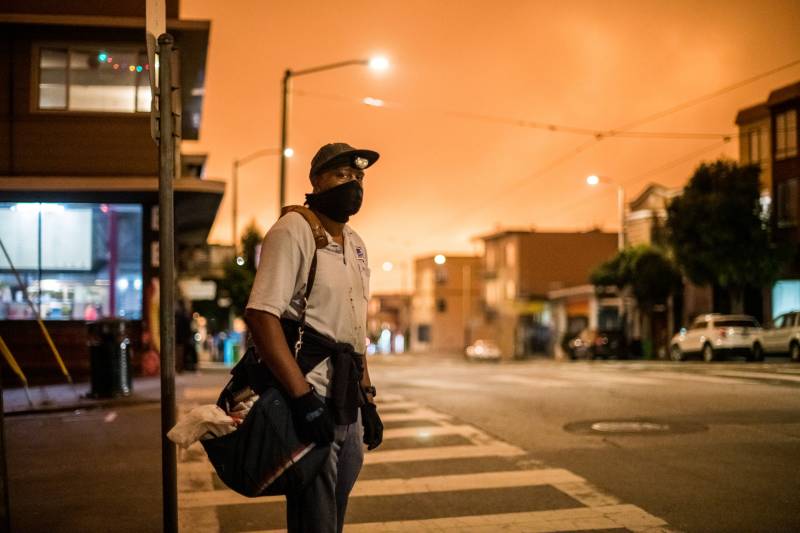The massive wildfires that continue to wreak havoc across California are collectively spewing huge plumes of smoke thousands of feet into the atmosphere, darkening the skies and soiling air quality throughout the Bay Area and much of the rest of the state.
What's All This Smoky Air Doing to Your Body? We Asked a Lung Doctor

To find out more about how all this smokiness is impacting our health, KQED’s Brian Watt recently spoke to Dr. Sharon Chinthrajah, director of the Sean N. Parker Center for Allergy and Asthma Research at Stanford University. Below are highlights from the interview, which has been edited for length and clarity.
What do we need to know about what we’re seeing and breathing outside these days?
I think these are unusual times, and we’re in a situation we’ve not been in before. So it’s very hard to understand what the actual risk is. We’re seeing a very different air than we’ve seen before. And this is actually the longest stretch of poor air quality we’ve seen in the Bay Area in a long time. … If you’re feeling symptoms, be your own good detective and stay inside.
Can you talk a little bit about the ash that is covering cars and other surfaces outside?
The ashes from the wildfires that are burning from California and Oregon, and being transported by winds across the Bay Area, these are larger particles that are dropping and visible in this film over surfaces outside. And typically, when we think about pollens — this is how I can relate to it — the larger pollens are not the ones that we worry about inhaling through our nose or through our mouth and causing inflammation in our lungs. You know, nowadays when we’re outside, we’re wearing a mask, so it’s hard to say. Those larger particles of ash are probably being filtered by the masks that we’re wearing, but we don’t know.
For wildfire smoke, we’re always worried about the smaller particles — the particulate matter, 2.5 [micrometers] or smaller — that land on our skin, land on mucosal surfaces of our eyes and our nose, in our lungs, and cause inflammation in our body, that might manifest as irritation of the eyes, runny nose, a cough, trouble breathing. And then this inflammation for patients who have underlying respiratory or cardiovascular conditions can cause exacerbation of those conditions. So, for my lung patients, I worry about asthma or COPD (chronic obstructive pulmonary disease) exacerbations where they have to use their rescue inhalers.
I’m advising my patients to continue to do the same things that they’ve been doing in these last three weeks: Monitor the air conditions in your local area and try to spend as little time as you can outside, really stay indoors with windows shut to protect yourself from wildfire smoke.
When you are making daily decisions about going outside, how do you read air quality maps?
That’s a great question. You know, if you’re a healthy individual, there are different cutoffs for the air quality index:
Typically above 150 (air quality index, AQI) is considered unhealthy for even normal, healthy people. Above 100 for anybody with respiratory conditions or cardiovascular conditions is considered unhealthy. And above 50 for some people who are exquisitely sensitive is considered unhealthy. Vulnerable populations like kids, pregnant moms, elderly people — typically I’m a little bit more cautious because we don’t know what longer-term exposure to wildfire smoke does to the inflammatory system and for these vulnerable populations.
Can you talk about the local health consequences of this combination of the coronavirus, heat waves and smoke episodes?
My patients, they come to me with many questions. You know, ‘I’ve had a cough now for many days. Is it because of the poor air quality? Is it because I might have gotten COVID? Is it because my asthma is acting up?’ And really, what I can advise patients is, if you’re concerned at all, if there’s a change in your health, reach out to your health care providers.
We are learning along with you, to try and ask the good questions, to distinguish between asthma exacerbation, allergies, wildfire smoke and COVID, because a lot of these can look very similar. And the best is to be careful about your activities.
